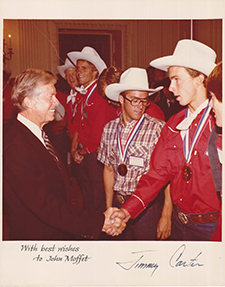USA Swimming News
Moffet Shares Special ‘Bond’ with Fellow 1980 Olympians

by Mike Watkins//Contributor
For decades, John Moffet’s gold medal from the boycotted 1980 Olympics sat dust-covered and forgotten.
It wasn’t lost. It was simply put away in a box absent from the many other accolades proudly displayed and admired from the history of his life in and out of the pool.
“When I found it, there was a dead spider on it, which was, no doubt, social commentary about what it meant to me for many years,” he said.
In case it’s not clear, the medal – which Moffet and his 1980 teammates were awarded as post-Olympic boycott concessions by President Jimmy Carter – had little value or importance to him.
To him and his teammates, it presented lost opportunities and was a painful reminder of Carter’s decision to not compete at the Moscow-hosted Olympic Games due to communist aggression in Afghanistan.
It was several decades later that Moffet learned from teammate Ron Neugent that the medals were actually designated as Congressional Gold Medals by Congress decades after Carter awarded them.
“We thought we were just getting a gold-plated medal from President Carter, but Ron investigated and found out in 2007 that they were actually Congressional Gold Medals; that changed how I saw them,” Moffet said. “When you think about it, that (not being told about the importance of the medals) was emblematic of the whole situation.”
Moffett was just 16 when he made the 1980 team, so he viewed the situation differently than many of the older athletes who saw those Games as their only opportunity to compete at the Olympics.
Four years later, in fact, Moffet, a then-sophomore at Stanford, made the 1984 Olympic team (which communist countries boycotted) and competed in Los Angeles as a gold-medal favorite and world-record-holder in the 100 breaststroke. He set the world mark that summer at Olympic Trials and also qualified in the 200 breaststroke.
In the 100 breast event prelims, however, he tore a muscle in his leg, and although he powered through to the final, he finished fifth and out of medal contention.
Due to the severity of the injury, he was forced to withdraw from the 200 breast and 400 medley relay.
Still, after the disappointment of not being able to compete four years earlier, Moffet said he was excited to be competing at these Olympics regardless of the injury.
“It was a fluke injury that happened at the worst time, but that’s the way things happen sometimes; that’s sports,” he said. “I achieved my goal – I got to compete in the Olympics. Even after the injury, there was no way I wasn’t going to compete, especially after 1980’s disappointment. These were the Olympics after all.”
Moffet spent the next few months rehabbing his leg, and he didn’t get back into competition until mid-November.
He underwent some intense physical therapy, and was able to recover to go on to win five individual and two team NCAA titles during his career for the Cardinal.
As a senior, Moffet served as co-captain and was honored as the top scholar-athlete in the PAC-10, receiving the NCAA Top VI Award – honoring the six most outstanding student-athletes in America.
But after his senior year at Stanford in 1986, while focusing on training for 1987 World Championships, he injured a tendon in the leg he didn’t hurt in 1984 by overcompensating for lingering effects from the first injury.
Moffet persevered and competed at 1988 Olympic Trials – finishing 8th in the 100 breaststroke – and at the conclusion of the meet, knew it was time to move on from swimming and pursue the next phase of his life and career.
“I was still able to compete at a high level (after 1984), but I felt like I was constantly battling injuries the rest of my career,” said Moffet, who raced bicycles for a while before getting back into serious training for swimming in 1987.
“Making the finals at 1988 Trials meant a lot to me because of everything I went through to get there. But I knew I was ready for something new in my life. Swimming had been a huge part since I was 11, and now I was ready to do something different.”
It didn’t take long for Moffet to find his niche – in television. He got a job as a production assistant – getting coffee, etc. – and one thing led to another.
He slowly worked his way onto movie sets – his first being an Anthony Michael Hall-led feature called A Gnome Named Norm directed – and that led to a Discovery documentary series where he went out with a second-unit camera shooting 16mm film.
“I shot and wrote that script because I knew all the footage,” Moffet said. “It was a tremendous experience. I actually never thought of myself as a writer before that, but I wrote a lot of show promos, and I quickly learned that I loved doing it.”
By the mid-2000s, Moffet was working on the highly successful CBS adventure reality show The Amazing Race, and he won successive Primetime Emmy Awards (2005-2007) as a supervising producer in the Outstanding Reality-Competition Program category.
In all, he produced TV for CBS, NBC, ABC and FOX, as well as The Discovery Channel, TLC, VH1, ESPN and HBO.
Shortly thereafter, he stopped working on the show and found his way out of TV production altogether, once again excited to do something new.
Eventually, his Congressional Gold Medal joined his other visibly notable awards like being named to the Stanford Athletic Hall of Fame and Pac-12 All-Century Team along with pictures from his first NCAA team championship in 1985 and another from their repeat victory in 1986 – this time with the president of Stanford wearing a Speedo.
“When we won in 1985, he told us if we won again the next year, he’d wear a Speedo in the group photo, and we won and he did,” Moffet said. “I’ve never been big on displaying my awards, but the medal did find a new spot outside of the box with dead spiders.”
These days, Moffet remains involved in the Olympic + Paralympic movement and is president of the Southern California Olympians + Paralympians Association.
He also serves as a board member for the US Olympians + Paralympians, LA Sports Council, Ready Set Gold! and Trident Swim Foundation.
Returning to his Olympic roots, he was a member of the LA2028 Athlete’s Advisory Commission for the Olympic + Paralympic Games, working hard to bring them back to the City of Angels, where he competed in 1984.
For this year’s Golden Goggle Awards show on Nov. 19, Moffet and his 1980 teammates will be recognized for their contributions to the sport as well as honored for the sacrifice they made.
Because of the boycott, they formed a special bond over the years and have remained in touch with one another in a way that most international teams don’t.
It’s a legacy that they share and will always share – and for Moffet, they are relationships he will always maintain and treasure.
“It was an unforgettable time in all of our lives, and when we get together or talk with each other, it’s like no time has passed; we’re able to pick up conversations right where we left off,” said Moffet, father to Graham and Emma and husband to Susan (Lenth), who was captain of Stanford’s 1989 NCAA Champion women’s team.
“These are some of my lifelong friends. We experienced something few others have or ever will or will ever be able to understand, and that has created a lasting bond. And even though we won’t be together physically for Golden Goggles this year, I hope everyone will turn up virtually. It’s always special to be together however we can.”
